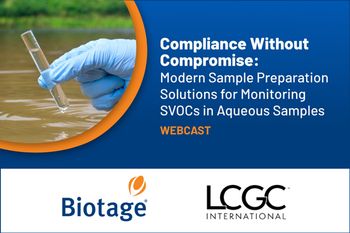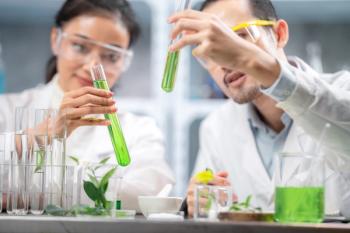
Scientists from the Chinese Academy of Agricultural Sciences in Beijing, China recently developed a new method for detecting antihistamines in milk samples.

Scientists from the Chinese Academy of Agricultural Sciences in Beijing, China recently developed a new method for detecting antihistamines in milk samples.

Here are the top five articles that the editors of LCGC International published this week.

Scientists are looking into using nitrogen as a substitute for helium in detecting persistent organic pollutants (POPs) in gas chromatography (GC).

Scientists recently analyzed the chromatographic profiles of postmortem bacterial species and their volatile organic compounds (VOCs) using comprehensive two-dimensional gas chromatography (GCxGC).

Here are the top five articles that the editors of LCGC International published this week.

The “farmer-managed natural regeneration,” or FMNR, project has been ongoing for more than two years, aimed at re-greening deforested land.

Governments are striving to implement policy changes towards a greater use of green technology, specifically around the generation of energy. Individuals and industrial organizations have also taken up the challenge, and now many companies are driving to significantly reduce their environmental footprint, or indeed become carbon negative within very short time frames.

Robust linear regression, stepwise linear regression, and linear regression were tested, compared, and combined in this experimental setup, in an effort to address an environmental problem with short- and long-term effects.

The 11th International Symposium on Recent Advances in Food Analysis will be in Prague, Czech Republic from 5–8 November 2024.

During the 18th International Symposium on Hyphenated Techniques in Chromatography and Separation Technology, experts presented a workshop on emerging industrial applications in MS.

Scientists from Wuhan Textile University recently tested a new solid-phase extraction system for analyzing covalent organic frameworks (COFs).

Here are the top five articles that the editors of LCGC International published this week.

Webinar Date/Time: Wednesday, June 12, and Thursday June 13, 2024 Morning Sessions: 9:00am - 11:15am EDT Lunchtime Sessions: 11:30am - 12:00pm EDT Afternoon Sessions: 12:15pm - 1:15pm EDT

Here are the top five articles that the editors of LCGC International published this week.

Webinar Date/Time: Wed, May 29, 2024 11:00 AM EDT

Elia Psillakis from the Technical University of Crete, Greece presents an update on the latest developments on sustainability and separation science.

U.S. Environmental Protection Agency (EPA) Method 1633 signifies a pivotal shift in per- and polyfluoroalkyl substance (PFAS) determination, extending beyond drinking water.

Selected ion flow tube mas spectrometry (SIFT–MS) offers real-time measurements directly from air without chromatography or sample preparation, providing an attractive alternative for these hard-to-measure volatile organic compounds.

French scientists recently created a new analytical method for quantifying micropollutants in different species of gammarids.

The North Carolina Collaboratory’s partnership with Thermo Fisher Scientific’s mass spectrometry instruments is designed to further research into per- and polyfluoroalkyl substances (PFAS).

Here are the top five articles that the editors of LCGC International published this week.

An examination of how chromatography could be used to solve the water crisis in the American southwest.

Webinar Date/Time: Wednesday, May 22, 2024 Asia: 10am SGT | 11am JST | 1pm AEDT | 3pm NZDT Europe: 11am CET | 10am GMT United States: 1pm EDT | 10am PDT

Scientists from the Chinese Academy of Inspection and Quarantine recently published a review on how green solvents can further the evolution of microextraction techniques.

Swedish and German scientists recently made a new system for detecting of selective androgen receptor modulators (SARMs) in human samples.